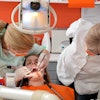
A supervisor appointed to head the College of Denturists of Ontario (CDO) is moving quickly to repair relations with denturists and denturism students.
The supervisor, Deanna Williams, has made it a priority to increase the fairness of qualifying exams being held this month and stop the CDO from moving into the areas governed by the Denturist Association of Ontario (DAO).
In January 2012, Ontario Health Minister Deb Matthews warned CDO officials that she would appoint a supervisor if they did not address "significant deficiencies in the college's practices and procedures" that were uncovered by a PricewaterhouseCoopers report. These deficiencies included having an unusually high failure rate -- 16 of 28 students at a Toronto college failed last year's exams -- and a bylaw change that would have required denturists to purchase malpractice from the CDO instead of the DAO.
While the CDO did address some of the deficiencies -- including reversing the malpractice-insurance bylaw change -- it did not rectify many other serious problems. Hence, on March 26, Matthews appointed Williams, who was the Ontario College of Pharmacists' registrar from 2000 to 2011.
Many changes already
The minister gave Williams a one-year term and the power to take any actions necessary to put the CDO back on the right course. Within a week, Williams had appointed a new president and vice president.
A month later she announced changes to the written and clinical denturism exams. She hired Anthony Marini, PhD, a psychometrician with expertise in examinations and testing, to review and revise the exams. While major changes could not be made to the 2012 exams, some important alterations were put through in time. These included reducing the number of multiple-choice questions in the written exam from 400 to 300 and increasing the exam's length from four to six hours. Williams worked with Dr. Marini and members of the CDO's examination committee to determine which 300 questions had the most reliability and validity in testing students' knowledge.
“We've done everything we can ... to make sure the exams are fair, transparent, objective, and impartial.”
— Deanna Williams, College of
Denturists of Ontario
"The very minimum allotment for entry exams should be one minute per question. One and a half minutes per question errs on the generous side, and we come in at 1.2 minutes per question, which is acceptable by industry standards," Williams told DrBicuspid.com at the June 29 meeting of the CDO's governing council, which had been re-established with qualified members.
In addition, for the first time the examination's criteria and the weighting assigned to the practical and written parts of the exam were to be posted on the CDO's website in advance of the exam period.
In another first, unsuccessful candidates will be given performance reports for their written and practical exams. These reports will detail whether students met, exceeded, or failed in each area, and how they performed in relation to their classmates.
"We've done everything we can from our end to make sure the exams are fair, transparent, objective, and impartial as they can be," Williams told DrBicuspid.com.
Petya Simeonova, DD, attended the June 29 meeting and expressed satisfaction with the changes being made. In 2011, she had to fight to be allowed to retake the exam after she failed -- despite being the gold medalist in her class at George Brown College in Toronto. She was among those who contacted the health minister to warn of problems at the CDO.
"I think there is hope because of positive changes being made by the supervisor and the [CDO's new] legal counsel," she said. "Some of my colleagues who were students in the year after me went through the written exam this May and they felt it's a normal exam."
Former CDO President Gus Koroneos, DD, declined to comment on the developments, saying he would "defer to the supervisor."
Standardized exams
At the June 29 meeting, Williams led the council members through a number of proposed bylaw changes aimed at increasing the professionalism of the CDO and its council.
Williams also described fence-mending meetings that she, Koroneos, and the new CDO president have had with officials and students at the two Ontario schools that offer denturism programs.
In addition, she noted, she has reached out to denturist regulators in other jurisdictions in the first-ever attempt to unify exams across Canada.
"The other provinces, principally Alberta and British Columbia, are very interested in collaborating on national, standardized curricula, which we absolutely need as a priority going forward," Williams said. "Because we have to make sure that what we expect from newly registered practitioners is what we're teaching and testing for in schools."



















